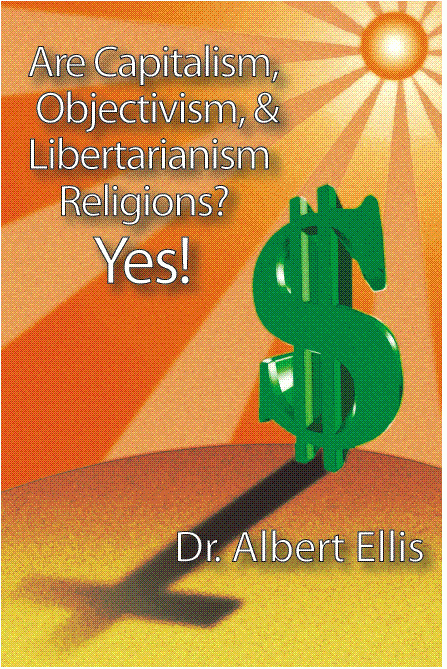Chapter 3
The Capitalists-Libertarian-Objectivist View of Economics*
One of the corner stones of Ayn Rand's philosophy is its deification of capitalism. In the main, her attitudes are unrealistic, dogmatic, and essentially religious, as are other objectivist views. Let me review some of the more blatant irrationalities of objectivist, capitalist, and libertarian economics.
Utopianism . To understand the evangelical upholding of capitalism, we'd better, right from the start, see that Rand and her associates are not defending any capitalist economy that is, or ever has been, in operation. On the contrary, they continually damn the American variety of capitalism, though extolling some of its virtues.
To quote Rand, "A system of pure, unregulated laissez-faire capitalism has never yet existed anywhere." (1966b). What existed were mixed economies, capitalism and statism--that is freedom and control, a combination of voluntary choice and government coercion. America is the freest country on earth, but it always has had elements of statism in its economy, developed by intellectuals who were horribly committed to the philosophy of statism--yes, horribly!
In fact, all economies, past and present, were and are a mixture of capitalism and collectivism. Moreover, it seems that a mixed economy is the only possible economic state. The more extreme a state is, either capitalist or collective, the less likely it is to last. The final economic form of the state will vary with culture, technology, the current environment and its resources. Since democracy, almost by definition, is based on compromise, it is logical that the economy of a democracy would be a mixture of collectivism and capitalism.
Rand 's idealistic notion of laissez-faire capitalism, if it did exist, is utopian and impractical for many reasons:
1. It is based on the supposition that people can live successfully on a purely selfish basis, without considering members of the social group. It does not consider the dualistic possibility that, as I noted in chapter one, people may be better off when they consider themselves first and the members of their community as a close second. I accept Rand's observation that every act is selfish since altruistic acts bring pleasant mental feelings or assuage mental pain. However, she abandons that logic when she exalts capitalism, implying that money and production themselves are a higher pleasure, and that they bring pleasant feelings innately. In reality, one can only buy things that might cause good feelings. After necessities are met, it is a personal preference as to where one finds pleasant feelings. Money's "value" will always be diminished by inflation and material things decay over time. While one can run out of money and possessions or have them taken away, one will always have the ability to sing, create art, tell jokes, hug a friend, kiss a lover, play a sport, etc., -- if one invests in developing such. True friendships and skills grow with time and practice without the drudgery and fear of competition. Money and physical assets demand constant care and the pleasure of possession is dualistic with the fear of loss.
Since people depend on their community for support and the enhanced wealth and health that living in that community brings, it seems that people will be better off if they do think of the community as a close second. Rand assumes that if people only go after what they want and think this is best, they will never harm others and or interfere with others' basic interests. In fact, Rand keeps claiming that the pure and entirely uncontrolled capitalist --if it ever existed--would invariably help all people by its productive drives and would rarely harm anyone. There is no evidence that this would be true. There is considerable historical evidence and reason for believing it would not.
For example, until the 1920's the utilities in the United States operated under little constraint. Their rates corresponded to the maximum amount that could be extorted from the community, and their service was usually poor. Many communities had to take over, or at least regulate, these utilities in order to provide a decent level of service to consumers. The recent Enron utility scandal has confirmed that capitalists have not changed, and still need regulation.
Governments that have existed under capitalism have seen fit to regulate industrial production, and usually in rigorous ways, because the majority of citizens who backed these governments believed that capitalism is to some degree inimical to the public welfare. This is not to say that capitalism is an unmitigated social evil, for it clearly is not. It has had great advantages and is possibly the most efficient kind of economy that humans have yet invented. But in its pure laissez-faire form, it appears to have great limitations--as most economists admit. In fact, capitalism is inherently inefficient. If there is to be competition, there must be choice. Choice requires that there be more product available than in demand. That means there will be products and services that either are not consumed or sold at a loss. That is, there will be lost effort, unused real estate, and wasted materials in the production of the products not sold or sold at a loss. Moreover there are many non-productive tasks that capitalism requires, which I will detail later in this chapter.
Rand 's vehement espousal of unadulterated capitalism is highly utopian--although it would be an interesting experiment to try pure laissez-fair e ism, just to see how successfully it can work. But because this kind of experiment most likely will not be attempted, Rand and her cohorts are safe in dogmatically insisting that ultra-pure capitalism would work; and, with this rigid assertion, they excoriate both semi-capitalistic and non-capitalistic economies.
It is interesting to note, in this connection, that Rand's view of pure capitalism resembles the views of many fanatical religions. Modified Judaism, Christianity, and Islam, say purists, do not work, and are even abominable; only an unalloyed, completely orthodox version of these religions would really work. When asked where one might find such an unqualified religious setup, they often reply: "In the Kingdom of Heaven." This statement is then taken as "proof" of the fact that pure religion is good, and all alloyed forms are bad. Q.E.D.!
The objectivist argument that mixed capitalism is horrendous because it cannot provide the heavenly advantages of pure capitalism is similar to this fanatically religious view. Essentially, in fact, it is a utopian religious view [1] .
(Note: You can view every article as one long page if you sign up as an Advocate Member, or higher).





